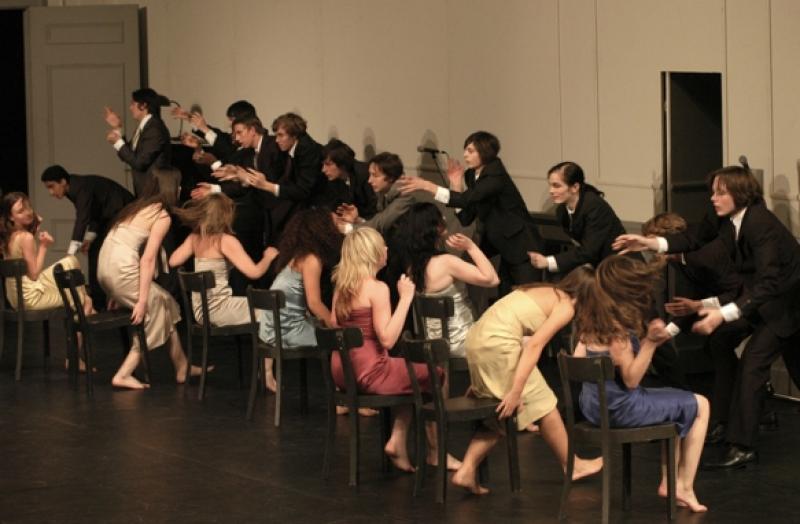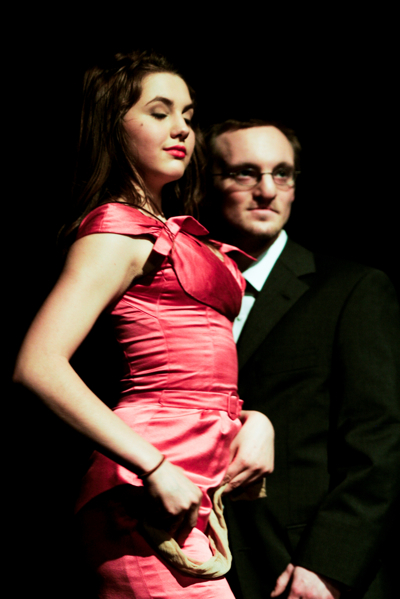Kontakthof, Tanztheater Wuppertal Pina Bausch, Barbican Theatre | reviews, news & interviews
Kontakthof, Tanztheater Wuppertal Pina Bausch, Barbican Theatre
Kontakthof, Tanztheater Wuppertal Pina Bausch, Barbican Theatre
Two amateur casts turn a masterpiece into an even greater masterpiece

A house of contact, a place to make contact - this bare, evocative title sits on one of Pina Bausch’s most appealing works, and also its most elastic. Brought this week to the Barbican posthumously, staged by her company on two amateur casts, Kontakthof didn’t look 32 years old, it looked both timeless and as fresh as fledglings cracking out of their egg shells.
In 1978 when this surreal and exact spinner of magical webs created the piece, the Berlin Wall was as impregnable as it had been for a generation and meetings carried less casual insignificance than today. Kontakthof then was danced by young professional dancers in her company born in the 1950s, to parents who were in the war. Now Kontakthof has been given two further existences, for amateurs - a version for over-65s, people who shared that life, that world, that same half-fearful childhood that Bausch knew, and one for teenagers born since the country's reunification.
When pensioners perform Kontakthof, the village hall on the stage (high windows, curtained stage, ropey upright piano, black bentwood chairs) becomes a day centre, a dance-hall of dreams and memories. They wear the same style of dresses as the kids do - glamorous, vaguely Fifties, satin cocktail dresses, and heels, of course (where would Bausch works be without high heels?) - but old people being old people, they are highly non-conformist. Some live more in the past than others, some are greater fantasists, others don't want to remember.
As they stand up before us, offering their teeth and hands for us to inspect, we’re clinicians, casting agents, border officials, a quarter expecting to see faded concentration camp tattoos, or proof that the old folk are fit enough to work. When the youngsters do the same, we’re parents, we’re seeing kids worried they don’t look grown-up enough, or enough like their idols, or secretly wondering if they'll have to have sex with their new boyfriend on the first date. It may be this effortless way that Kontakthof peels the skin off souls young and old, and responds with love and nostalgia to their differences, that makes it such a piercing joy to experience. Could anyone but Pina Bausch put a masterpiece on amateurs and make it look even more like a masterpiece?
The nearly three hours fly by, borne along on a series of old café songs, tangos, love songs, strains of romantic classical music, like a soundtrack of memories. The characters appear to be auditioning for (maybe) an amateur performance set somewhere in Alice's crazed Wonderland. They tell a snatch of story in German or cracked English, or climb carefully up on a chair and laugh in a way that is discomfitingly pitched between hilarity and hysteria. After their three seconds at the microphone, the others applaud politely. They carefully learn their social dancing, switching between partners in games that seem like a speeded-up version of a life of missed opportunities, a sort of musical chairs where you must find a spare partner, or be lost. Or they fall over, to be totally ignored.
 Lovers in pairs demonstrate different shades of relationships by performing the same series of caresses, in increasing gradients of violence, so that what is tender in the first pair by the fourth has turned into a mutually sadistic war, with the male slapping the female’s bottom hard, while she grinds her stiletto into his foot. As Bausch said in an interview that you can read on theartsdesk, for some people life would be boring without violence in their relationship.
Lovers in pairs demonstrate different shades of relationships by performing the same series of caresses, in increasing gradients of violence, so that what is tender in the first pair by the fourth has turned into a mutually sadistic war, with the male slapping the female’s bottom hard, while she grinds her stiletto into his foot. As Bausch said in an interview that you can read on theartsdesk, for some people life would be boring without violence in their relationship.
Then there are the shades of the brothel, the meat market, that come unbidden to mind watching the teenagers (aged 14 to 19) strutting with their hooker-red lipstick, their mothers’ evening dresses, or for the boys their too-soon learning of physical domination of girls, itemising their date’s attractiveness (pulling up her arm, pulling her head around) like a Magimix demonstrator expecting a sale. With the older folk, this is pregnant with embarrassment, like when your mother dressed too daringly when she was middle-aged, or a senile old grandad suddenly unleashes an adolescent sex drive.
As usual, this is a dance-play rather than a contemporary dance, and as usual it is a paean to woman-watching, their plumage, their mating rites, their power-sex games. The movement sequences are meticulously fashioned from observed body language, the little tics of discomfort and adjustment that women automatically adopt, hitching a bra strap, surreptitiously hoiking down their pants when they stand up, or trying to smoothe a wandering girdle. Bausch’s eye misses nothing - she makes an entire tango of silly walks from a foot-grinding motion that I swear is derived from having stepped in stilettos in muck and trying to wipe it off them on a doormat. The bottom sticks out, the knee bends, the heel grinds, wipes awkwardly either side while the hips push unstably from this side to that, the hands bunch as if doing the twist. All together now - and there is a dance of pure Jabberwockian glory, vividly and hilariously eloquent about human beings' little unconscious ways.
The differences in physical strength that are marked and interesting in the older performers with their wide age range - the powerful old lady, the withered old man - become in the younger cast differences in that crucial quality, aplomb. The eyecatching thing with the teenage cast is what very strong stage personalities are already evident among them - several of them could effortlessly translate up into the “adult” version of Kontakthof, it seems, particularly the adorable, irresistible two girls, one skinny and blonde, the other voluptuous and chestnut-haired, who lead these daffy, perceptive and wholly entertaining revels. How Bausch will be missed. But Kontakthof holds out a promise that life and her captivatingly absurd and truthful work continues without her.
- Tanztheater Wuppertal Pina Bausch perform Kontakthof at the Barbican Theatre until Sunday.
- Tanztheater Wuppertal Pina Bausch performs the Brazil-inspired Agua in the Edinburgh Festival (27-29 August, Playhouse)
- The company's web site
- Check out what's on at the Barbican this season
Share this article
The future of Arts Journalism
You can stop theartsdesk.com closing!
We urgently need financing to survive. Our fundraising drive has thus far raised £49,000 but we need to reach £100,000 or we will be forced to close. Please contribute here: https://gofund.me/c3f6033d
And if you can forward this information to anyone who might assist, we’d be grateful.

Subscribe to theartsdesk.com
Thank you for continuing to read our work on theartsdesk.com. For unlimited access to every article in its entirety, including our archive of more than 15,000 pieces, we're asking for £5 per month or £40 per year. We feel it's a very good deal, and hope you do too.
To take a subscription now simply click here.
And if you're looking for that extra gift for a friend or family member, why not treat them to a theartsdesk.com gift subscription?
more Dance
 'We are bowled over!' Thank you for your messages of love and support
Much-appreciated words of commendation from readers and the cultural community
'We are bowled over!' Thank you for your messages of love and support
Much-appreciated words of commendation from readers and the cultural community
 R:Evolution, English National Ballet, Sadler's Wells review - a vibrant survey of ballet in four acts
ENB set the bar high with this mixed bill, but they meet its challenges thrillingly
R:Evolution, English National Ballet, Sadler's Wells review - a vibrant survey of ballet in four acts
ENB set the bar high with this mixed bill, but they meet its challenges thrillingly
 Like Water for Chocolate, Royal Ballet review - splendid dancing and sets, but there's too much plot
Christopher Wheeldon's version looks great but is too muddling to connect with fully
Like Water for Chocolate, Royal Ballet review - splendid dancing and sets, but there's too much plot
Christopher Wheeldon's version looks great but is too muddling to connect with fully
 iD-Reloaded, Cirque Éloize, Marlowe Theatre, Canterbury review - attitude, energy and invention
A riotous blend of urban dance music, hip hop and contemporary circus
iD-Reloaded, Cirque Éloize, Marlowe Theatre, Canterbury review - attitude, energy and invention
A riotous blend of urban dance music, hip hop and contemporary circus
 How to be a Dancer in 72,000 Easy Lessons, Teaċ Daṁsa review - a riveting account of a life in dance
Michael Keegan-Dolan's unique hybrid of physical theatre and comic monologue
How to be a Dancer in 72,000 Easy Lessons, Teaċ Daṁsa review - a riveting account of a life in dance
Michael Keegan-Dolan's unique hybrid of physical theatre and comic monologue
 A Single Man, Linbury Theatre review - an anatomy of melancholy, with breaks in the clouds
Ed Watson and Jonathan Goddard are extraordinary in Jonathan Watkins' dance theatre adaptation of Isherwood's novel
A Single Man, Linbury Theatre review - an anatomy of melancholy, with breaks in the clouds
Ed Watson and Jonathan Goddard are extraordinary in Jonathan Watkins' dance theatre adaptation of Isherwood's novel
 Peaky Blinders: The Redemption of Thomas Shelby, Rambert, Sadler's Wells review - exciting dancing, if you can see it
Six TV series reduced to 100 minutes' dance time doesn't quite compute
Peaky Blinders: The Redemption of Thomas Shelby, Rambert, Sadler's Wells review - exciting dancing, if you can see it
Six TV series reduced to 100 minutes' dance time doesn't quite compute
 Giselle, National Ballet of Japan review - return of a classic, refreshed and impeccably danced
First visit by Miyako Yoshida's company leaves you wanting more
Giselle, National Ballet of Japan review - return of a classic, refreshed and impeccably danced
First visit by Miyako Yoshida's company leaves you wanting more
 Quadrophenia, Sadler's Wells review - missed opportunity to give new stage life to a Who classic
The brilliant cast need a tighter score and a stronger narrative
Quadrophenia, Sadler's Wells review - missed opportunity to give new stage life to a Who classic
The brilliant cast need a tighter score and a stronger narrative
 The Midnight Bell, Sadler's Wells review - a first reprise for one of Matthew Bourne's most compelling shows to date
The after-hours lives of the sad and lonely are drawn with compassion, originality and skill
The Midnight Bell, Sadler's Wells review - a first reprise for one of Matthew Bourne's most compelling shows to date
The after-hours lives of the sad and lonely are drawn with compassion, originality and skill
 Ballet to Broadway: Wheeldon Works, Royal Ballet review - the impressive range and reach of Christopher Wheeldon's craft
The title says it: as dancemaker, as creative magnet, the man clearly works his socks off
Ballet to Broadway: Wheeldon Works, Royal Ballet review - the impressive range and reach of Christopher Wheeldon's craft
The title says it: as dancemaker, as creative magnet, the man clearly works his socks off
 The Forsythe Programme, English National Ballet review - brains, beauty and bravura
Once again the veteran choreographer and maverick William Forsythe raises ENB's game
The Forsythe Programme, English National Ballet review - brains, beauty and bravura
Once again the veteran choreographer and maverick William Forsythe raises ENB's game

Add comment